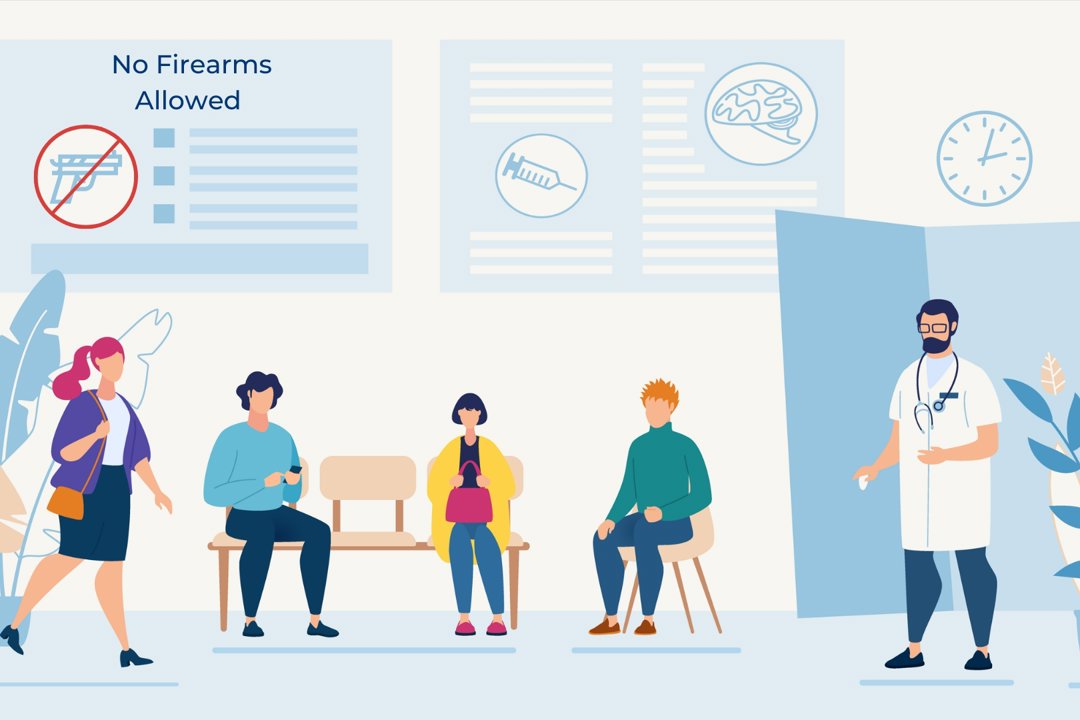
- Patients
When the Patient has a Gun in Arizona
What are your legal rights if a patient brings a firearm into your medical practice in Arizona?
What can and should I do if a patient comes to an appointment openly carrying a weapon or firearm?
If a person comes in openly carrying or if they pull up a pants leg or shirt for examination and exposes a concealed weapon or firearm, it can be handled the same. In Arizona, a person over 18 may legally openly carry a firearm or deadly weapon without a permit within the state, except for certain prohibited locations. To carry a concealed firearm or deadly weapon, a person must be over 21 years old. A private establishment such as a physician’s office may prohibit the carrying of firearms or deadly weapons by giving reasonable notice to the public that they are prohibited. A “no firearms” sign has the force of law, and therefore legal penalties for entering private property or a business that has posted signs. Arizona law specifies that the sign conform to the following requirements:
- Be posted in a conspicuous location accessible to the general public;
- Contain a pictogram that shows a firearm with a red circle and a diagonal line across the firearm;
- Contains the words “No Firearms Allowed Pursuant to A.R.S. § 4-229”.
The law also provides requirements about the type and size of letters and printing to be used, such as in the example provided.
If a patient or visitor enters an office that displays a “No Firearms” sign, you may ask the patient or visitor to leave the premises and return without the firearm. If the patient or visitor refuses to leave the premises, you may call law enforcement. On the other hand, if your office does not post a “No Firearms” sign, you may still ask the patient or visitor to leave and return to the office without the firearm. However, if the patient or visitor declines to leave, you would need to decide whether to proceed with the office visit. If you decline to treat a patient, whether or not in need of care, you could be subject to an allegation of unprofessional conduct before the medical board or even a medical malpractice claim. Additionally, you risk escalating the situation and losing patient trust. Therefore, the better practice, if the patient or visitor is not perceived as a threat, is to see the patient and, so long as there is no disruption by the patient or visitor, complete the visit. However, if there is any type of threat or disorderly conduct, you may ask the patient to leave and call law enforcement for assistance.
Can I require patients to disclose whether they are carrying a weapon or firearm?
There is no law prohibiting you from asking this question, whether or not you have posted a “No Firearms” notice. If you do have such a notice, this may be the only way to determine if someone is carrying a concealed weapon. Additionally, if the weapon is concealed, the patient may decline to answer the question. On the broader topic of gun safety, firearms in the home pose a well-established risk to household members of homicide, suicide and unintentional death. For this reason, medical societies and the American Medical Association encourage physicians to counsel patients about those risks as part of good medical practice. In opposition to this recommendation, in 2011 the state of Florida passed a law restricting doctors from asking about guns. However, in 2017 the law was overturned by a federal appeals court.
Can I prohibit weapons and firearms in my practice? What about patients who are law enforcement officers?
Yes, so long as you post a notice as described above. If a patient is a law enforcement officer, and the officer is not in the office for law enforcement purposes, the officer should be asked to follow the office prohibition on firearms.
